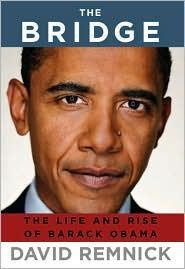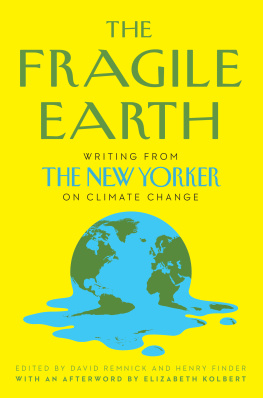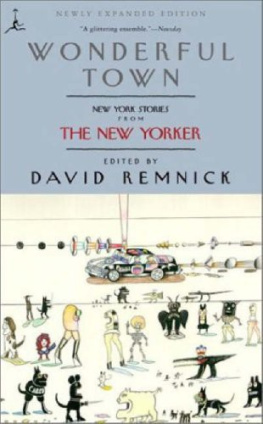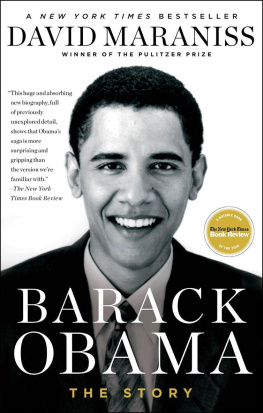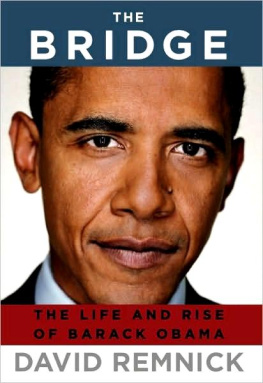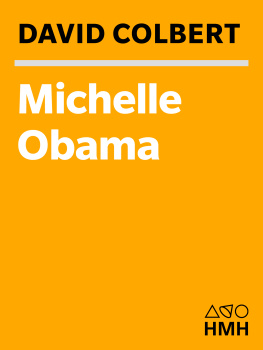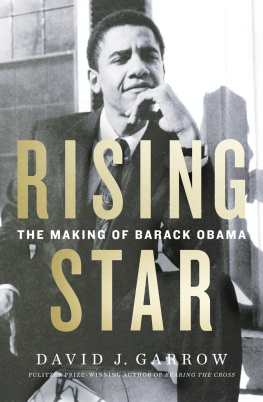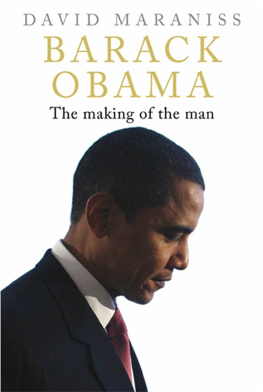ALSO BY DAVID REMNICK Reporting: Writings from The New Yorker King of the World: Muhammad Ali and the Rise of an American Hero Resurrection: The Struggle for a New Russia The Devil Problem: And Other True Stories Lenin's Tomb: The Last Days of the Soviet Empire
There's no question that in the next thirty or forty years , a Negro can also achieve the same position that my brother has as President of the United States .--Robert F. Kennedy, May 27, 1961, Voice of America I remember when the ex-Attorney General, Mr. Robert Kennedy, said it was conceivable that in forty years in America we might have a Negro President. That sounded like a very emancipated statement to white people. They were not in Harlem when this statement was first heard. They did not hear the laughter and bitterness and scorn with which this statement was greeted. From the point of view of the man in the Harlem barbershop, Bobby Kennedy only got here yesterday and now he is already on his way to the Presidency. We were here for four hundred years and now he tells us that maybe in forty years, if you are good, we may let you become President .--James Baldwin, The American Dream and the American Negro (1965) Barack Obama is what comes at the end of that bridge in Selma .--John Lewis, Washington, D.C., January 19, 2009
3.
6.
11.
15.
Prologue
The Joshua Generation
Brown Chapel
Selma, Alabama
This is how it began , the telling of a story that changed America.
At midday on March 4, 2007, Barack Obama, the junior senator from Illinois, was scheduled to speak at Brown Chapel, in Selma, Alabama. His campaign for President was barely a month old, and he had come South prepared to confront, for the first time, the Democratic frontrunner, Hillary Clinton. He planned to discuss in public what so many believed would ultimately be his undoing--his race, his youth, his "exotic" background. "Who is Barack Obama?" Barack Hussein Obama? From now until Election Day, his opponents, Democratic and Republican, would ask the question on public platforms, in television and radio commercials, often insinuating a disqualifying otherness about the man: his childhood in Hawaii and Indonesia; his Kenyan father; his Kansas-born, yet cosmopolitan, mother.
Obama's answer to that question helped form the language and distinctiveness of his campaign. Two years out of the Illinois State Senate and barely free of his college loans, Obama entered the Presidential race with a serious, yet unexceptional, set of center-left policy positions. They were not radically different from Clinton's, save on the crucial question of the Iraq war. Nor did he possess an impressive resume of executive experience or legislative accomplishment. But who Obama was, where he came from, how he came to understand himself, and, ultimately, how he managed to project his own temperament and personality as a reflection of American ambitions and hopes would be at the center of his rhetoric and appeal. In addition to his political views, what Obama proposed as the core of his candidacy was a self--a complex, cautious, intelligent, shrewd, young African-American man. He was not a great man yet by any means, but he was the promise of greatness. There, in large measure, was the wellspring of his candidacy, its historical dimension and conceit, and there was no escaping its gall. Obama himself used words like "presumptuous" and "audacious."
In Selma, Obama prepared to nominate himself as the inheritor of the most painful of all American struggles, the struggle of race: not race as invoked by his predecessors in electoral politics or in the civil-rights movement, not race as an insistence on ethnicity or redress; rather, Obama would make his biracial ancestry a metaphor for his ambition to create a broad coalition of support, to rally Americans behind a narrative of moral and political progress. He was not necessarily the hero of that narrative, but he just might be its culmination. In the months to come, Obama borrowed brazenly from the language and imagery of an epochal American movement and applied it to a campaign for the Presidency.
The city of Selma clusters around the murky waters of the Alabama River. Selma had been a prosperous manufacturing center and an arsenal for the Confederate Army. Now it is a forlorn place of twenty thousand souls. Broad Street ordinarily lacks all but the most listless human traffic. African-Americans live mostly in modest houses, shotgun shacks, and projects on the east side of town; whites tend to live, more prosperously, on the west side.
Selma's economy experiences a burst of vitality during the annual flowerings of historical memory. The surviving antebellum plantation houses are, for the most part, kept up for the few tourists who still come. In mid-April, Civil War buffs arrive in town to commemorate the Confederate dead in a re-enactment of the Battle of Selma, where, in 1865, a Confederate general, a particularly sadistic racist named Nathan Bedford Forrest, suffered defeat. The blacks in town do not share in the mood of Confederate nostalgia. An almost entirely black housing project just outside of town was, for decades, named for General Forrest, who had traded slaves and became Grand Wizard of the Ku Klux Klan.
After the Civil War, black students came to Selma University, a small Bible college, and the town--a town of churches--became renowned as a center of African-American preaching. wrote in his memoirs, "was to many of us the 'Capital of the Black Belt,' a place where intelligent young people and learned elders gathered." At the same time, because of the grip of Jim Crow, Selma was, as late as the nineteen-sixties, a place of literacy tests and poll taxes; almost no blacks were able to register to vote. Surrounded by disdainful white registrars, they were made to answer questions like "How many bubbles are there in a bar of soap?"
The local sheriff, Jim Clark, was in the grotesque folkloric mold of Birmingham's Bull Connor; he wore a button reading "Never" on his uniform and could be relied upon to take the most brutal measures against any sign of anti-segregationist protest--which is why, as the civil-rights movement developed, the grassroots leaders of the Southern Christian Leadership Conference (S.C.L.C.) made Selma a test case in the struggle for voting rights.
, 1965, Martin Luther King, Jr., came to Brown Chapel, a brick citadel of the African Methodist Episcopal Church, and told the congregation that Selma had become a "symbol of bitter-end resistance to the civil-rights movement in the Deep South." Just as Montgomery had been the focus of the first bus boycotts and the struggle for civil rights and equal access to public facilities, Selma, King and his comrades decided, would be the battleground for voting rights.
Barack Obama had been invited to Selma more than a month before the anniversary event by his friend John Lewis, a veteran congressman from Atlanta. In his late sixties, portly and bald, Lewis was known around Capitol Hill and in the African-American community less as a legislator than as a popularly elected griot , a moral exemplar and a wizened truth-teller of the civil-rights movement. During the long "conservative darkness," from the first Reagan inaugural onward, Lewis said, it was especially "hard and essential" to keep progressive politics alive. "And the only way to do that was to keep telling the story," he said. While King was organizing for the S.C.L.C. in Alabama, Lewis had been the chairman of the Student Nonviolent Coordinating Committee (SNCC). Lewis was present at nearly every important march. He was at King's side at the front of countless demonstrations and in meetings with John Kennedy and Lyndon Johnson in the Oval Office. He was the youngest--and most militant--of the many speakers at the March on Washington in 1963; now he was the only one among them still alive. People called John Lewis a hero every day of his life, but now he was feeling quite unheroic, unsure whom to support: the Clintons, who had "never disappointed" him over the years, or a young and talented man who had introduced himself to the country with a thrilling speech at the 2004 Democratic Convention in Boston. At first, Lewis signaled to Obama that he would be with him, but the Clintons and their circle were appealing to his sense of friendship and loyalty--and they were almost as hard to resist as the lure of history. Feeling acute pressure, Lewis promised both the Clintons and Obama that he would soon have "an executive session with myself" and decide.

